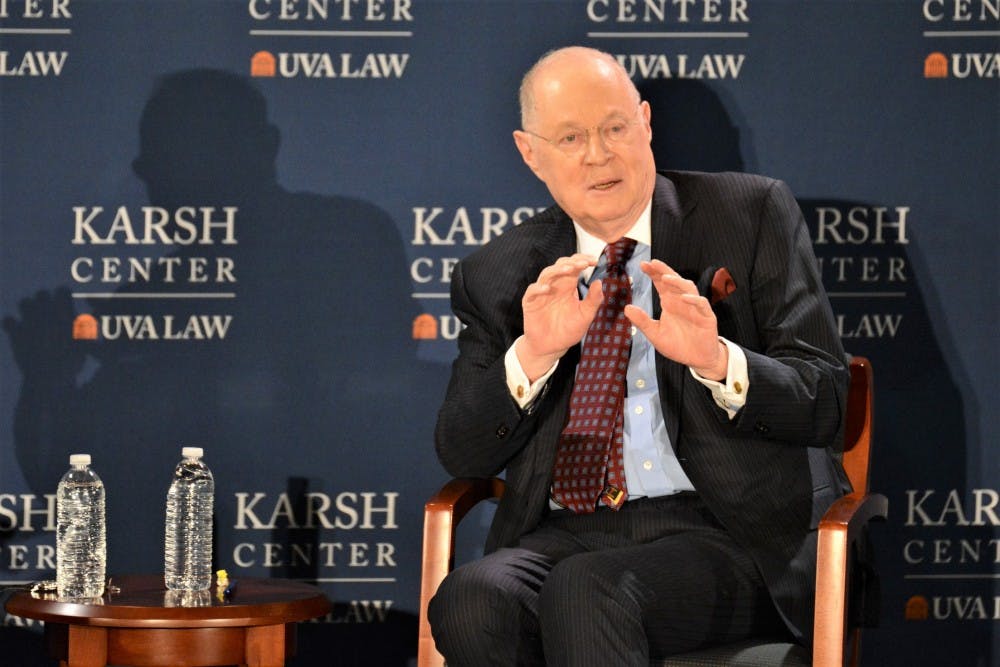Recently-retired United States Supreme Court Justice Anthony Kennedy addressed the special role of the Court in American democracy and the importance of returning civility to politics in an event at the Law School Friday. Kennedy served on the court for roughly 30 years, from 1988 to 2018.
Meant to inaugurate the school’s new Karsh Center for Law and Democracy, the event was run as a televised interview for PBS hosted by philanthropist and television personality David Rubenstein of the Bloomberg series “The David Rubenstein Show”.
The Karsh Center was initiated from a $44 million donation from its namesake philanthropists Bruce and Martha Karsh, who met while attending the Law School in the 1970s. The organization’s stated goal is to promote “civil discourse and democratic dialogue, civic engagement and citizenship, ethics and integrity in public office, and respect for the rule of law” through both legal and cross-disciplinary scholarship.
Bruce and Martha Karsh both spoke prior to Rubenstein interview with Kennedy, each expressing great appreciation and gratitude for the retired justice. Bruce Karsh, who clerked for Kennedy while the justice was a judge on the Ninth Circuit of the U.S. Court of Appeals in San Francisco, spoke particularly highly of Kennedy’s genuineness and emphasis on family.
Quoting Thomas Jefferson, who wrote that “Honesty is the first chapter in the book of wisdom”, Martha Karsh added, “I can think of no one better to speak today than [Justice Kennedy], who has dedicated his life to these ideals.”
In the interview itself, Rubenstein focused heavily on the role of the Supreme Court in recent times and how it operates, as well as Kennedy’s own lengthy legacy in the legal realm. Kennedy officially left his position in June after announcing his intention to retire personally to President Donald Trump at the White House.
Upon being asked by Rubenstien if he had any second thoughts on retiring, Kennedy answered, “None at all.” Rather than returning to a lower-level judgeship as many retired Supreme Court justices have done in the past, Kennedy for the time being plans on continuing to lecture and write, as well as spend more time with his wife Mary.
Rubenstein’s questions also touched heavily on Justice Kennedy’s prominent role in the country’s political affairs in recent years. As one of the Court’s longest-serving justices, he has played a pivotal role in several of the Supreme Court’s most influential decisions over the past decade. These include Obergefell v. Hodges (2015), the decision that led to the legalization of same-sex marriage in all 50 states, and Citizens United v. Federal Election Commission (2010), which upheld legal protection for corporate donations to political parties and campaigns, both of which Kennedy wrote the majority opinion for.
Kennedy has authored 276 majority opinions during his career — 92 of which were 5-4 votes. Kennedy has frequently been identified as a swing vote on the court, though he argued that the court swung as a whole, not himself.
In regards to Obergefell, Kennedy noted the case as one of the key moments of his career. “In a sense, I think it surprised me,” the justice added. “The nature of injustice is you can’t see it in your own time.”
The interview also addressed Kennedy’s views on the controversial and nationally-prominent confirmation of the Court’s newest justice Brett Kavanaugh, who was elevated to the position this September amidst protests after a series of tense Congressional hearings. Senators voted 50-48 to confirm along solidly partisan lines, with only one Democrat, Sen. Joe Manchin III (D-W.Va.), voting in favor of Kavanaugh.
But Kennedy said he believes the Supreme Court can remain nonpartisan.
“The public will see,” Kennedy said. “We’re the only branch of government that gives reasons for what it does … You will see that the system has worked and that these justices are working very well together.”
Sexual assault allegations against Kavanaugh were made public by Dr. Christine Blasey Ford in addition to two other alleged victims shortly after the justice’s nomination was announced. Kavanaugh vehemently denied the accusations throughout the confirmation process, leading to public outcry over the nominee’s character and temperament as a prospective justice.
Notably, both of the justices confirmed under President Trump — Kavanaugh and Neil Gorsuch — have also clerked for Kennedy in the past.
In terms of ensuring the Court’s continued integrity and adherence to its mission of upholding democracy, Kennedy also repeatedly praised the Supreme Court’s historic commitment to impartiality and a lack of partisanship as crucial qualities going forward.
“I tell young judges … your duty in every case is to ask why are you doing what you’re about to do,” Kennedy said. “You take an oath that you’re going to listen to both sides and if you make up your mind beforehand, you’re not following that oath.”
When asked about his legacy, the retired justice also called for change in America’s currently polarized political discourse.
“We need to restore civility and decency in our dialogue — that’s how democracy will be restored,” he said.







